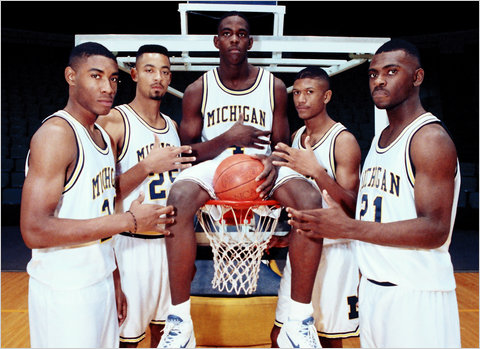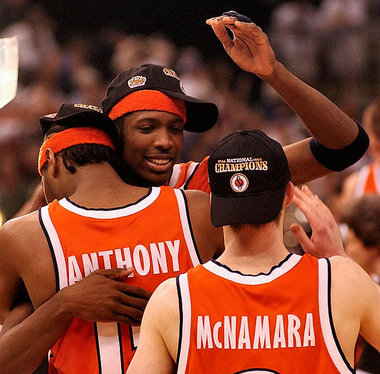20 Questions: Can a Team of Freshmen Win a National Championship?
Posted by Brian Joyce on November 8th, 2011Brian Joyce is an SEC microsite staffer and occasional contributor.
Question: Can a Team of Freshmen Win a National Championship?
It’s an easy question, so I have a simple answer. Yes, of course, a team of mostly one-and-done players can win the national title. That’s the beauty of college basketball, and more specifically the “lose and you’re out” nature of March Madness. Any team can win it all, as VCU and Butler proved this past year by advancing to the Final Four.
The question has been answered already on a number of occasions. Several teams with a nucleus of freshmen players have taken their teams to Final Fours and even come awfully close to winning a National Championship. The infamous Fab Five of the 1991-92 Michigan Wolverines were arguably the greatest recruiting class ever assembled. Despite their youth at a time when juniors and seniors dominated the college basketball landscape, the Fab Five overpowered opponents all the way to the national title game. It was there that Michigan met one of the best college basketball teams ever in the Duke Blue Devils, and simply didn’t have the focus and ability to play their level of basketball.
A similar scenario occurred years later as the 2006-07 Ohio State Buckeyes put together a tremendous freshmen class led by Greg Oden and Mike Conley, Jr., that took the Buckeyes all the way to the final game. Ohio State ran into a team on a mission for its second consecutive title, as the young Buckeyes couldn’t handle Joakim Noah, Al Horford and the rest of the Florida Gators.
Even last year, freshmen were instrumental at the Final Four when Connecticut and Kentucky squared off. Although junior Kemba Walker was the resident superstar, a total of eight freshmen played significant minutes in that national semifinal and the diaper dandies combined to tally 65 of the 111 total points scored in the game. Like it or not, freshmen are making more and more of an impact on the game because talented players will play. And talented players win games.
The McDonald’s All American game, a good measure of the most outstanding high school seniors entering the college game, was established in 1978. Since then, every National Championship team has had at least one McDonald’s All American on its roster except one. The lone exception — the 2001-02 Maryland Terrapins. Good teams are assembled with at least the basic premise that its players have talent. Better teams have more talent. In fact, 11 National Championship teams since 1978 had at least eight McDonald’s All Americans on their roster, an embarrassment of riches that only the most elite teams can accumulate. There’s a reason that schools such as Butler and VCU eventually become overmatched at some point in the Tournament. The thing is, experience doesn’t win championships. Talent wins championships. Most of the time, teams with talented freshmen don’t lose because of inexperience. They lose because they face teams with more talent. But that’s not why ’92 Michigan and ’07 Ohio State lost. There’s something else that ’92 Duke and ’07 Florida possessed. Great teams need more than talent — great teams need superb team chemistry as well.
The 2002-03 Syracuse Orange are proof that teams can mesh talented freshmen and upperclassmen together. The Orange didn’t just come close to a title, Syracuse won it all in 2003. And they did it by starting two freshmen (Carmelo Anthony and Gerry McNamara) and playing a third in a significant role (Billy Edelin). It was those three freshmen that led the way in the championship game. McNamara, the starting point guard, hit six first half threes and steadied Syracuse through the remainder of the game. Anthony took over the game with 20 points, 10 rebounds and seven assists on his way to the Final Four’s Most Outstanding Player award. Even Edelin came off the bench with 12 points and three steals. No matter how youthful, Syracuse had a future NBA star who led them to victory. But more importantly, Syracuse jelled as a team. Assistant coach Mike Hopkins said Syracuse had to come together after Edelin became eligible midway through the season. “We lost the first game with him,” Hopkins said. “We lost to Rutgers. That’s why good teams have more chemistry at the end of the year.” Syracuse’s success was as much attributed to how quickly they came together as a team as it was to how much talent they had.
We could hypothesize indefinitely about scenarios this year, but the real question is if the Kentucky Wildcats and their constant restocking of one-and-done talent can win the National Championship. For a team starting as many as three freshmen this year, the answer is the same as before — of course they can. Kentucky may lack experience, but they make up for it in sheer talent and athleticism. The 2010 Wildcats couldn’t shoot their way out of a 1-3-1 zone. The 2011 version of Kentucky freshmen didn’t have the depth to go the distance. This year’s squad has all that and more. The Cats have six McDonald’s All-Americans, four of whom are freshmen who have never played a minute of college basketball. But as we’ve seen in the past, that doesn’t matter. Anthony Davis, Michael Kidd-Gilchrist, Marquis Teague and Kyle Wiltjer are really, really good. Great, in fact.
Kentucky’s freshmen aren’t a hindrance to the Wildcats winning the National Championship, rather they’re the reason the Cats are even in the discussion. Teague has uncanny speed and an ability to drive the lane. He can drive and dish to open teammates as evidenced by his nine assists in Kentucky’s first exhibition game. Wiltjer can stretch opposing defenses with his outside shooting ability. Kidd-Gilchrist is a hard-nosed defender with a motor that never stops. His active play has led John Calipari to already name him a starter. And finally, Davis has shotblocking ability and extraordinary athleticism and length. The Wildcats have the talent for a special season in Lexington. But that isn’t enough.
The most impressive aspect of this early season for Kentucky, however, is how quickly they have come together as a team. “Nobody is out here playing for themselves,” Davis said, “or ‘oh well, I want to go to the NBA, so I’m just worried about me.'” “We want good team chemistry,” Wiltjer added. “We’ve all worked hard together in the summer to build that up because we all realize that’s what it’s going to take.” The talent in Lexington is undeniable. But the Michigan Wolverines had talent in 1992, as did Ohio State in 2007. The Kentucky Wildcats are working on something more than that — a blend of talent and chemistry. Continue to come together as a team, and the 2011-12 Wildcat newcomers will cut down the nets, and do what the 2002-03 Syracuse team couldn’t do — put an end to this debate once and for all.















































